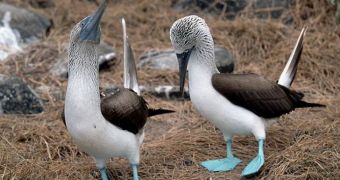According to a recent paper in the journal Avian Conservation and Ecology, the Galápagos Islands are now in danger of losing their blue-footed boobies. Thus, wildlife researchers say that the overall headcount for this species has fallen by over 50% over the past 20 years.
In said paper, specialists detail that a drop in the blue-footed booby population in the Galápagos Islands was first documented back in 1997. At that time, researchers noticed that, unlike in previous years, there were not all that many birds present at breeding sites for this species.
“Until 1997, there were literally thousands of boobies at these breeding sites, and hundreds of nests full of hatching chicks. Then, suddenly, the boobies just weren't there,” specialist Dave Anderson with the Wake Forest University in the United States said in a statement.
Shortly after making this discovery, wildlife researchers took to monitoring several blue-footed boobies breeding colonies in this part of the world. All in all, they checked up on four colonies at intervals of three to five months.
It was thus discovered that, between May 2011 and June 2013, i.e. the duration of this research project, birds belonging to these colonies showed little to no interest in breeding. Hence the fact that just 134 young birds were spotted at these sites throughout the duration of the study.
“It was alarming. This was a drastic change from the 1980s and 1990s, when young blue-foots were common throughout the archipelago,” Dave Anderson commented on the findings of this investigation, as cited by Phys Org.
Wildlife researchers have reasons to believe that the blue-footed boobies population in the Galápagos Islands has declined to such an extent over the past 20 years due to the fact that these birds no longer have access to as many sardines as they did in the past.
More precisely, evidence indicates that, now that they have been left without this food source, the birds are pretty much refusing to breed and look after new generations. This hypothesis is backed up by previous research showing that these seabirds only breed during periods when sardines make up most of their diet.
Scientists have not yet confirmed this, but it is possible that blue-footed boobies are having a hard time finding sardines to feed on as a result of overfishing. On the other hand, it could be that climate change or other environmental factors have caused this fish species to leave the waters around the Galápagos Islands.

 14 DAY TRIAL //
14 DAY TRIAL //